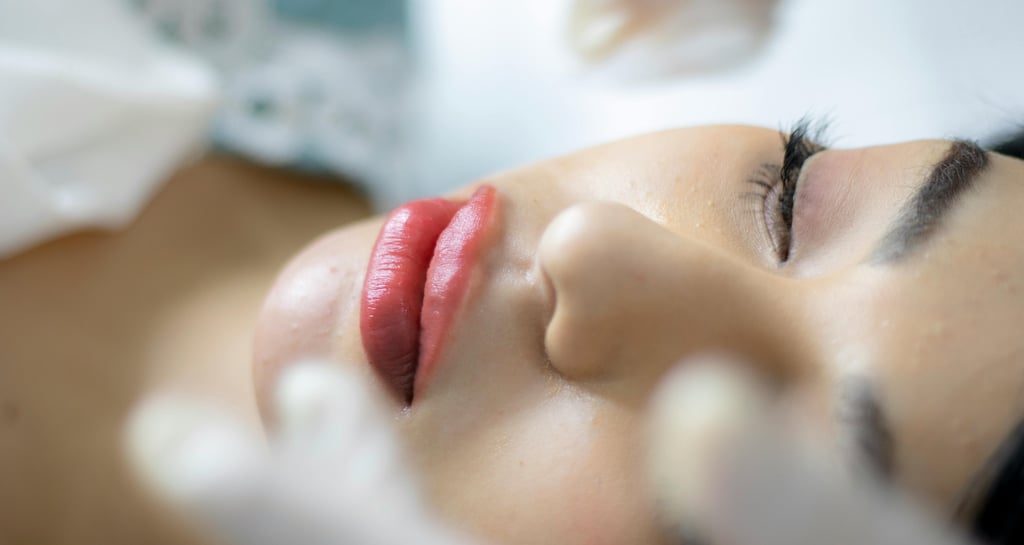The Secret to Healthy, Glowing Skin: The Power of Hydration
Discover the key to healthy, glowing skin with a hydration-focused skincare routine that nourishes, replenishes, and locks in moisture for a smooth, radiant complexion.


We’ve all heard the buzz about hydration when it comes to skincare, but let’s take a moment to dive into why it’s truly the foundation of healthy, glowing skin. It’s more than just slapping on a moisturizer—it’s about understanding how hydration works and why it’s essential for your skin’s overall health.
Our skin is constantly exposed to environmental stressors like pollution, the sun, and temperature changes, all of which can leave it feeling dry, tight, and irritated. When our skin is properly hydrated, it not only looks more radiant, but it also functions better by protecting us from external elements and keeping moisture locked in.
Why Hydration Matters More Than You Think
Think of hydration as the lifeblood of your skin. Without it, your skin becomes dull, fine lines become more visible, and you may notice an uneven texture. Dehydrated skin struggles to heal, loses elasticity, and can even become more prone to breakouts because it starts overproducing oil to compensate for the lack of moisture. The good news? With a little extra care, you can restore your skin’s hydration balance and see noticeable improvements in both texture and glow.
Understanding the Right Hydration Ingredients
When it comes to hydration, not all ingredients are created equal. Let’s talk about the key players you should look out for when shopping for your skincare routine:
Hyaluronic Acid
If you've ever used a product with hyaluronic acid, you probably noticed how quickly your skin feels plumper and more hydrated. That’s because this powerhouse ingredient can hold up to 1,000 times its weight in water! It acts like a sponge, drawing moisture from the environment into your skin, ensuring long-lasting hydration. Hyaluronic acid isn’t just for dry skin—it works for all skin types, even oily skin, by balancing moisture levels and preventing that uncomfortable tightness.Glycerin
Glycerin is another humectant that helps pull water into your skin. It also creates a protective layer on the surface, preventing moisture from evaporating throughout the day. Think of it as a moisture-locking agent that ensures your skin stays hydrated even in harsh weather conditions.Ceramides
Ceramides are lipids (fats) that form part of the skin’s protective barrier. When your skin’s barrier is intact, it can better retain moisture and shield itself from irritants. Adding ceramides to your routine helps strengthen your skin’s natural defenses, ensuring that hydration stays where it belongs.Peptides
Peptides are like the building blocks for skin repair. They not only support hydration but also boost collagen production, which keeps skin firm and youthful-looking. When combined with hydration-focused ingredients, peptides help maintain moisture balance while also improving the overall appearance of your skin.
The Hydration Routine You Need
Now that we understand the importance of hydration and the ingredients that work wonders, let’s talk about the best way to introduce these ingredients into your routine.
Start with a Hydrating Cleanser
The first step in your routine should always be a gentle cleanser that doesn’t strip your skin. Avoid harsh formulas that leave your skin feeling tight and dry. Opt for a hydrating cleanser that removes dirt and oil while maintaining your skin’s natural moisture. A good start sets the tone for the rest of your routine.Tone Your Skin
A hydrating toner not only restores your skin’s pH balance but also preps your skin to better absorb the active ingredients that come next. Look for a toner with hydrating ingredients like glycerin or rose water that can help replenish moisture from the get-go.Serum for Deep Hydration
This is where the magic happens. Serums are more concentrated than other skincare products and deliver intense hydration where your skin needs it most. Look for a serum with hyaluronic acid as the main ingredient to give your skin an immediate moisture boost that lasts all day.Seal in Moisture with a Rich Moisturizer
After applying your serum, lock in that hydration with a rich, nourishing moisturizer. Choose a moisturizer that suits your skin type—whether it’s a lightweight gel for oily skin or a thicker cream for dry skin. The key is to ensure that the moisture you’ve built up throughout your routine stays sealed in.Don’t Forget Sunscreen!
Sunscreen is often the forgotten step, but it’s absolutely essential when it comes to maintaining hydrated, healthy skin. UV rays dry out the skin, speeding up the aging process and depleting hydration levels. Protect your skin daily with a broad-spectrum sunscreen to prevent sun damage and keep your skin looking fresh and hydrated.
Listen to Your Skin
The beauty of a good hydration routine is that it’s versatile and adaptable. Your skin might feel extra thirsty one day and not so much the next, depending on factors like the weather, stress, and diet. So, it’s important to listen to your skin and adjust your routine as needed. If your skin is feeling dry or tight, try layering a hydrating mist throughout the day or adding an extra serum for an added moisture boost.
The Bottom Line? Hydration is Key
When your skin is properly hydrated, it has a more youthful, radiant appearance and can better defend itself against environmental stressors. A solid hydration routine will give your skin the love it needs to stay soft, smooth, and glowing. Whether you’re in your 20s or 50s, making hydration a priority is one of the best things you can do for your skin. So, drink plenty of water, use products packed with moisturizing ingredients, and watch your skin transform.
Healthy, glowing skin is just a few hydrating steps away—start your journey today!
Reflection Task: Deepening Your Hydration Routine
To ensure you're getting the most out of your hydration-focused skincare routine, take a moment to reflect on your skin’s needs and progress. Here’s a simple task to guide you:
Assess Your Skin's Current Hydration Level
Start by looking at your skin in different areas. Do you notice any dry patches, tightness, or dullness? How does your skin feel throughout the day—does it feel hydrated and soft, or does it start to feel tight and dry after a few hours? Recognizing where your skin lacks hydration will help you address specific needs.
Evaluate Your Skincare Products
Review your current skincare routine. Are you using products that focus on hydration? Check the ingredients in your cleanser, serum, and moisturizer. Are they rich in hydrating ingredients like hyaluronic acid, glycerin, or ceramides? If not, consider adding them to your routine to support better moisture retention.
Track Your Progress Over Time
Keep a journal of your skin’s condition as you implement your hydration routine. Notice how your skin changes after a week of consistent use of hydrating products. Are you seeing smoother, plumper skin? Has your complexion become more radiant, and do you feel that your skin has more elasticity and bounce? Write down your observations to track progress.
Reflect on Your Skin’s Needs Throughout the Day
How does your skin feel in the morning versus the evening? Does it need more hydration after you’ve cleansed in the morning, or does it need extra moisture in the evening before bedtime? Understanding how your skin behaves during the day can help you optimize the timing of your hydration routine, allowing for maximum benefits.
Consider External Factors
Take note of any external factors that might affect your skin’s hydration, such as weather changes, air conditioning, or environmental pollution. On days when you’re exposed to these factors, try adding an extra layer of hydration or misting your skin with a refreshing toner or facial spray.
Reflect on How Your Skin Feels
After a few weeks of following your hydration-focused skincare routine, reflect on how your skin feels. Does it feel more nourished, soft, and balanced? If not, consider adjusting the frequency of application or incorporating more intense hydrating treatments, such as a hydrating mask or overnight serum.
